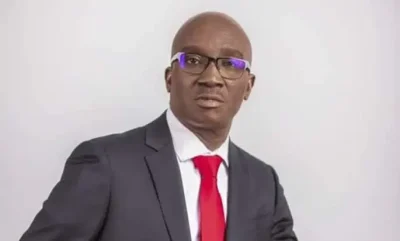The Court of Appeal sitting in Abuja, on Thursday, affirmed the election of Governor Monday Okpebholo of Edo State.
The court, in a judgement by a three-member panel led by Justice M. A. Danjuma, dismissed an appeal the Peoples Democratic Party, PDP, and its candidate, Asuerinme Ighodalo, filed to challenge the outcome of the governorship election that held in the state on September 21, 2024.
The appellate court held that it found no reason to dislodge the May 15 judgement of the Edo State Governorship Election Petition Tribunal, which validated the declaration of governor Okpebholo of the All Progressives Congress, APC, as winner of the gubernatorial contest.
It will be recalled that the Justice Wilfred Kpochi-led three-member panel dismissed as lacking in merit, petitions by the PDP and its candidate; the Action Alliance, AA, and its National Chairman, Adekunle Rufai Omoaje; as well as a case that was brought before it by the Accord Party, AP, and its own candidate, Dr. Bright Enabulele.
The tribunal held that it found no reason to nullify the outcome of the governorship election declared in favour of the APC and its candidate, Okpebholo.
The Independent National Electoral Commission, INEC, had declared that Okpebholo of the APC secured a total of 291, 667 votes to defeat his closet rivalry, Ighodalo of the PDP, who got a total of 247, 655 votes.
Dissatisfied with the result, the petitioners approached the tribunal, alleging that the election was not conducted in substantial compliance with provisions of the Electoral Act, 2022.
In the petition marked: EPT/ED/GOV/02/2024, PDP and its candidate alleged that governor Okpebholo did not secure the highest number of lawful votes that were cast at the election.
It was equally the contention of the petitioners that INEC failed to serialise and pre-record some of the sensitive materials that were deployed for the poll, a situation they said aided the rigging of the election in favour of the APC and its candidate.
Specifically, PDP and its candidate alleged that there was wrong computation of results in 765 polling units in the state, even as they produced 19 witnesses that testified and tendered exhibits before the tribunal.
Among exhibits the petitioners tendered before the tribunal, included a total of 153 Bimodal Voter Accreditation System, BVA, machines that were used in 133 polling units.
According to the petitioners, results from the polling units were manipulated at the collation centers, a situation they said resulted in over-voting, in Okpebholo’s favour.
However, in its judgement, the tribunal held that the petitioners failed to by way of credible evidence, establish why the outcome of the election should be set-aside.
It held that the onus of proving that governor Okpebholo was unduly returned by INEC, rested squarely on the petitioners, a legal burden it said was not successfully discharged.
According to the tribunal, the PDP and its candidate merely dumped exhibits before it without demonstrating them through competent witnesses as required by the law.
It held that most of the witnesses that testified for the petitioners gave hearsay evidence, stressing that failure to produce polling unit agents, presiding officers or voters that participated in the election, to testify, proved fatal to the case of the petitioners.
The tribunal held that section 137 of the Electoral Act did not preclude the petitioners from producing necessary and competent witnesses to testify in support of their case.
It further dismissed contention of the petitioners that contrary to the provision of section 73(2) of the Electoral Act, INEC failed to pre-record most of the materials that were deployed for the election.
More so, the tribunal held that none of the BVAS machines tendered before it were switched on to demonstrate that the number of votes recorded in the disputed polling units, exceeded the total number of accredited voters.
In its verdict, the appellate court upheld the decision of the tribunal.
Meanwhile, Ighodalo, on Thursday, vowed to take his case before the Supreme Court


